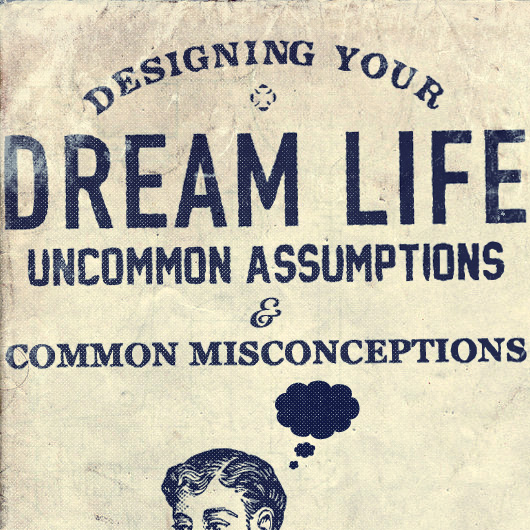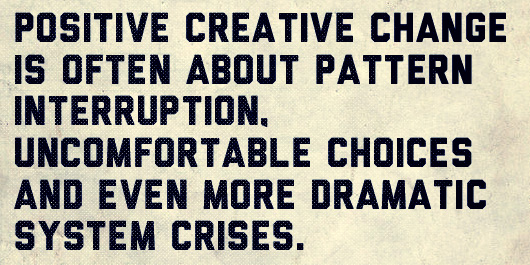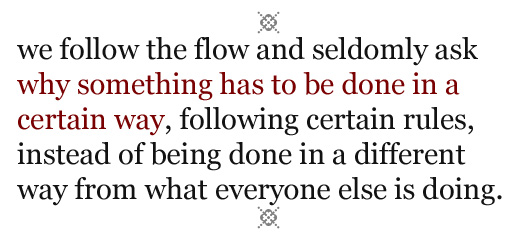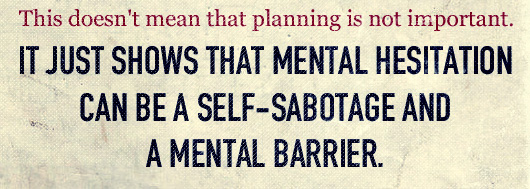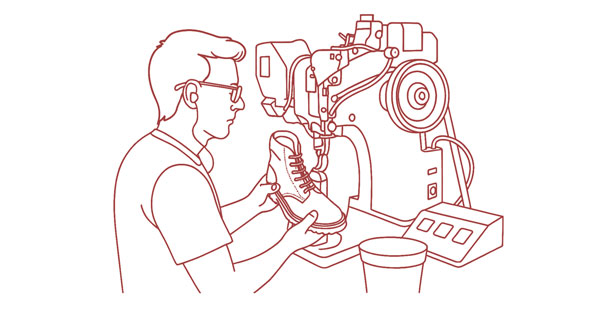“Don't limit yourself. Many people limit themselves to what they think they can do. You can go as far as your mind lets you. What you believe, remember, you can achieve.” – Mary Kay Ash
When I was a high school student, Sociology was the only class I attended voluntarily and with a reasonable dash of genuine enthusiasm. One topic that had caught my fancy at the time was the so-called processes of socialization vs. individualization. In plain English, there are two forces battling each other out in the span of one's lifetime. At one corner there's the heavyweight titan – the norms and values of our society and culture injected into our individual psyche through education, upbringing and interaction with our social peers. At the other corner there's the lightweight fighter – our authentic individual self, personality, hidden talents & creative being – fighting its way to claim some territory in the outside social world.
If people's lives had to be chronicled, it would emerge that unfortunately the titan wins most of the fights hands down. The way we see our life, our values and expectations are for the large part played out by how those values and expectations were handed down to us by society. It may also be uncomfortable to learn that so are most of what we refer to as our goals and ‘dreams'.
Living Out the Social Templates
The average person in his or her 20s, has more or less ready-made templates about how life should pan out: Graduate from college, find a steady well-paying job, settle down, buy a house, get married, have kids and ultimately work crazy hours for over four decades to build a reasonable pension that will get you covered through the retirement age.
The real question is whether this is one of the models accepted and encouraged by society or a truthful following of our heart's calling. Put bluntly, the litmus paper could be as simple as this: if you are comfortable doing what you are doing, find it mostly acceptable and normal by your peers and it doesn't feel at odds with how others are thinking, then the chances are that you're following a model laid down for you by social conformity and convention. If on the other hand the life changes you are after feel like a thunder in a cloudless sky, a shock to the system, uncomfortable or at odds with the general way people think and feel, then chances are you are following your heart's calling. Sounds crude, I know, but a good indicator nonetheless.
The thing is this – we are cog wheels in the social machine by default. Some of us free themselves from the machine cycle and develop their natural & individual abilities to the full. They allow creativity to take place, in the sense that they create their own dreams and destiny instead of passively reacting to external situations through socially ‘programmed' responses.
Positive creative change is often about pattern interruption, uncomfortable choices and even more dramatic system crises. An uninspiring and boring job, for instance can be tolerated but pure hell forces us into action. Anything less than hell can be endured with ifs, buts and rationalization of the mind.
The Tragedy of the Average Life: Being Sucked Up in The Matrix
Most of us have watched and loved The Matrix Trilogy. The whole story about being ‘locked' in the Matrix without one's knowing is a brilliant metaphor to how we actually live our lives. We are to some degree all locked up in the social matrix. We see, perceive, believe and behave within the limits and rules laid out by the Matrix – the cultural and social norms implanted in our view of the world.
We are often sucked up by group thinking and group morality without leaving enough space to nurture a more creative mindset. We allow what is socially normal and acceptable to be personally normal and acceptable.
If you're a kid and declare you want to become an astronaut or a fire eater, your ambitions aren't dissented or frowned upon but if you're 25 and announce you are quitting your job for a year's trip around the world to collect inspiring stories for a book you want to write, you will probably be advised to think it over and get real.
6 Common Barriers to Creating Your Dream Life
What holds us from creating our dream life? Each one of us has his or her personal barriers to achieving one's authentic goals and dreams but there are a set of commonly experienced barriers that are good to have on one's check list.
1. The ‘when I have more money' mentality
This is a classic one. We always tend to equate major life changes with changes in income and wealth. It's like the only way we can follow our authentic dreams and leap out from the system is by a major financial boost. “When I have more money I will spend my time traveling and being inspired by art instead of being stuck in a cubicle”. However even though following your goals require financial support of varying degrees, the mistake is to assume that more money must flow in before even starting to embark on your real life journey or that financial boost is the end in itself.
2. Getting the timing right
I was always a victim of this and still am on some occasions. Trying to get the timing right is a waste of time – forget it. The bottom line is that the timing is never right – whether for changing a job, having kids, starting a new profession, etc. The reason is that life is made of so many unforeseen variables and chaotic twists that it's impossible to get the timing right most of the time. You've got to boldly plunge into the change, then learn, adapt and act smart. This doesn't mean that planning is not important. It just shows that mental hesitation can be a self-sabotage and a mental barrier.
3. Trading a fulfilled interesting life for comfort and security
Fear of uncertainty, failure and being unaccepted by family and peers pushes the average person to ditch the chances of leading a fulfilled interesting life, doing things he or she is passionate about for a 9 to 5 job or whatever life situation can keep us in the “I'm safe and comfortable today let's worry about my dream life tomorrow'.
4. Not questioning common knowledge & folk wisdom
This problem is as old as time. As mentioned above, the average person is very easily caught in the net of group thinking and morality. In this mindset we follow the flow and seldomly ask why something has to be done in a certain way, following certain rules, instead of being done in a different way from what everyone else is doing.
5. Living other people's dreams
Antagonism with our peers is good sometimes because it pushes us into action. This is mostly true with young people. However benchmarking with others can lead us into following someone else's dream instead of our authentic ones. For example, you might have got into college because it was a common goal within your circle of friends or important for your parents but later discovered that your true path was lying somewhere else.
6. Being reasonable all the time
This took me many years to understand. Trying to be reasonable by compromising with everybody and trying your best not to step on anyone's toes or not to brush off people close to you will ultimately impoverish your chances and limit you from taking affirmative and critical decisions in life needed to take you from where you are to where you really want to be.
Re-calibrating the Compass of Life
Here are a few practial ideas that will shed more light on how you can redesign the way you do and approach things in view of achieving your authentic goals.
Taking the red pill
Back to The Matrix analogy. An iconic part of the movie is when Neo (the protagonist) is offered a choice between a blue pill and a red pill by Morpheus (his mentor). The blue pill would allow him to remain in the fabricated reality of the Matrix. The red pill would lead to his escape from the Matrix and into the “real world”. This is another important analogy for life. We may live our entire life in the comfortable illusion that things are as they are and cannot be lived or experienced differently. Or we may install a habit of not taking things for granted, of questioning established knowledge and knowing that there is always a different way of doing things but most of the time we don't see it because we are tranced by group thinking.
Redefining values
Tim Ferriss bestselling book ‘The Four Hour Work Week‘ explains how the currency of the new rich is not only money but more importantly time and mobility. You can be earning $10,000 per month but working your butt off without ever seeing the light of day. The new rich according to Ferriss see and value things differently. You would be much better off by comparison if you were earning $3,000 per month but working only 20 hours per month while doing trekking in South America and leaving the admin work of your low maintenance business to be outsourced by three people from anywhere around the world. More time equals more self worth because it allows us to be able to follow the things that really excite us and in line with our life's purpose.
Plotting the absurd in detail
The concept here is to think really big and absurd but plan small and realistically. Many times I get caught in the mistake of coming up with a fantastic grand idea on a new project or business but plan it out in a likewise grandiose fashion. I can tell you this doesn't work because the excitement evaporates when it doesn't have achievable steps to follow. Start by writing down your wildest dreams without fear of being silly or unrealistic. Split them into ‘having' (material and other acquisitions), ‘being’ (fluent in Korean, a Yoga master, etc) and ‘doing’ (visiting Tibet, learning deep sea diving in Tasmania, etc).
Convert the being and having into doing, that is, into action steps necessary for reaching your goal. Estimate how much it would cost you in monthly income to achieve these goals. This will put them in a more tangible and doable context. Keep on narrowing down your mega goals until they come down to achievable weekly or daily steps and budgets. This is how plans, no matter how big, are achieved.
The art of doing less
We are stuck in a mode of thinking where more equals better. We work harder, fill up our spare time with more projects, become overloaded by information and waste hours from our leisure time checking emails on our smartphone or writing down notes about even more work. It's not about being more productive but about doing less-meaningful work so as to free up time to do things that excites us more.
It's all about excitement!
It's not money, status or achievement. Guess what? it's not even about happiness. It's about what gets you and keeps you excited. It's about doing things that keep you motivated even to the point of losing sleep or skipping meals. The secret of successful and driven people is that they follow that passion to the point of obsession or behaving unreasonably in order to achieve the desired goals.
Focus on strengths not on fixing weaknesses
We all have weaknesses and an Achilles' heel. Instead of wasting precious time and energy trying to correct or fix our weaknesses it is much more effective and easy to leverage on our strengths and do what we know best. This will get us to our goals faster.
Pessimistic optimism
Sometimes it is a powerful exercise to face those fears that keep you postponing from reaching your goals by asking a few simple questions: “What is the worst that can happen if I follow this dream?”, “If I lose my job tomorrow, what things can I put in place to skim it off another few months?”, etc. These are uncomfortable questions we avoid but can be liberating and surprisingly refreshing and reassuring once we deal with them. You may even realize you don’t need to wait to “lose” your job.
Concluding remarks
Following our authentic dreams and being aligned with our purpose is tantamount to a happy fulfilled life and it's no wonder that many of us consider it as unachievable or extremely difficult. This is because our view of the world has been skewed and heavily influenced by how our culture and society perceives what is real and what is normal.
If I had to squeeze this article in two lines it would be this: Achieving our authentic dreams and goals requires that we first realize that a lot of our assumptions of the world and ourselves are not our own. We then seek to work smarter, not harder, to do the things that excite us most by doing less inconsequential work, focusing on our strengths and thinking big but planning our goals in small achievable steps and budgets.



